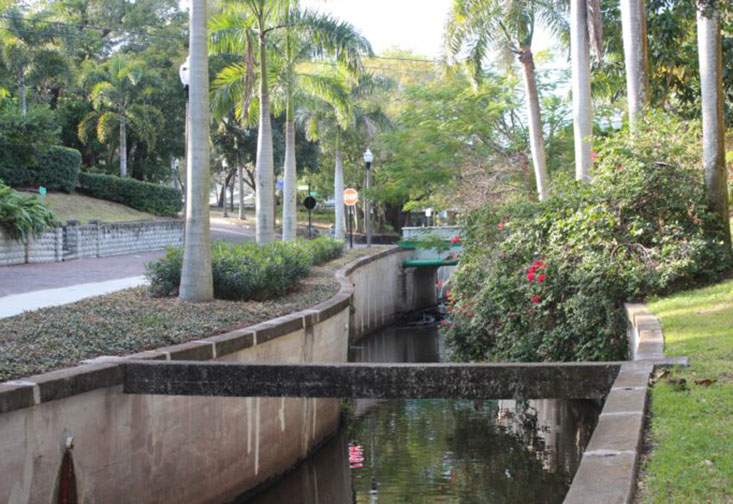USF St. Petersburg will host a community forum on Friday, February 15, to discuss the past, present and future of St. Pete’s Booker Creek. The forum will bring together a local historian, minister and business leader to provide their unique perspectives on this storied urban stream at Nelson Poynter Memorial Library from 3 to 4:30 p.m.
You’d be forgiven for not knowing Booker Creek, although you’ve almost certainly seen it. The creek runs roughly three miles through South St Petersburg—from the west side of I-275 to the southern edge of the USFSP campus. Along its route, the creek flows under Central Avenue, around Tropicana Field, beneath I-175 and through Campbell Park and Roser Park before depositing into Bayboro Harbor.
Though it may be largely unknown, even among residents, recent public conversations about the redevelopment of the “Dome District,” where the Trop currently stands, makes it an impending issue for the city. Such conversations provided the impetus for Dr. Thomas Hallock, Professor of Literature and Florida Studies at USFSP, to organize the forum.
“As we continue to develop around Booker Creek, we need to take into account its ecological and community history,” said Hallock, who will serve as the forum’s MC. “It’s important for our healing as a community. If we look at the creek solely in terms of its investment possibility, we neglect its longer history.”
That history dates back to the 1920s, when racially segregated communities began to establish in Campbell Park and the Gas Plant district, which was razed in the 1970s to make way for I-175. The interstate connected I-275 with downtown but effectively cut off Campbell Park, Hallock argues.
During the forum, historian Gwendolyn Reese will offer an overview and history of the Gas Plant district and the African American community in St. Pete. Reverend Jana Hall-Perkins will discuss the spiritual and religious effects of uprooting a neighborhood. While Barbara Voglewede, the executive director or the Edge Business District Association, will discuss potential future development plans around the waterway.
“Booker Creek is one of the last remnants of our city’s earliest origins, and one of our greatest natural resources,” Voglewede says. “Particularly in this time of rapid urban development, the importance of preserving it and its history cannot be overstated.”
As part of the Booker Creek project, Hallock and his graduate students in his environmental writing course will assemble materials for a self-produced book on the creek. The class will select newspaper clippings, while providing their own essays to tell the story of the creek’s social, ecological and economic reach.
Hallock invites writer, photographers and artists to contribute their own work to the publication. He’s seeking art, photographs, non-fiction essays, poems and remembrances about Booker Creek and the communities along its banks. Three students will each receive a $50 prize for the submitting outstanding non-fiction prose, photography/drawing, or poetry. The deadline for submission is March 8.
For more information, contact thallock@mail.usf.edu.
